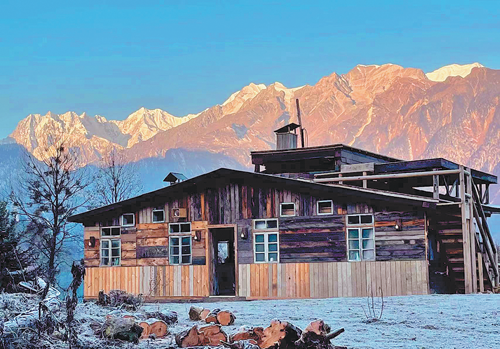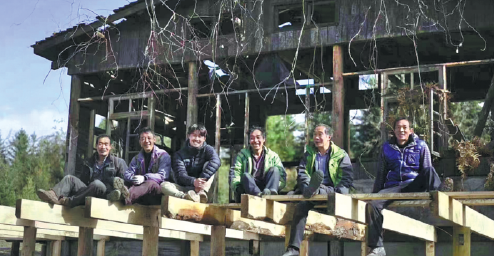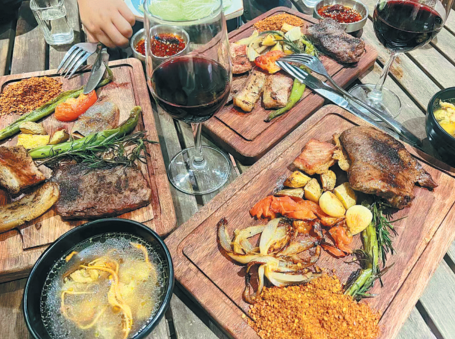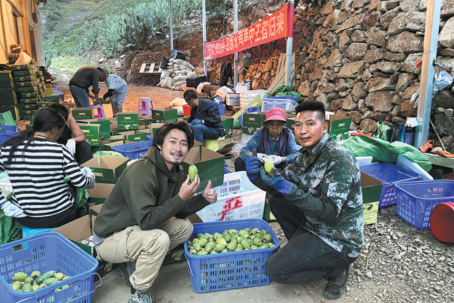Rooms with a view on the summit of beauty
Cabins transform livelihoods as tourist windfall rewards years of toil, Yang Feiyue reports.

The smile has returned to Chen Jianyong's face as life resumes to its normal pace after a magnitude 6.8 earthquake jolted his mountaintop resort in September.
"Guests are coming back," says Chen, who was born and bred in a small village that sits in the neighborhood at Hailuogou, a scenic spot in Luding county, Garze Tibetan autonomous prefecture, Southwest China's Sichuan province.
It boasts stunning natural beauty, and is especially known for huge glaciers and snowcapped peaks. It is a favorite and much-loved spot for visitors.
Chen's place allowed visitors to soak in the scenery from a good vantage point and prolong their stay in the wilderness.
"We had many guests on vacation when the earthquake happened," Chen recalls.
He played a positive role in taking care of his guests during the natural disaster before rescuers came. "Fortunately, everyone eventually left safely," he says.
Yet, Chen was faced with huge damage in the wake of the quake. "The kitchen that had served our family for 20 years collapsed. Even the stove that my father built by himself crumbled," Chen says.
All the things that he had taken great pains to build on top of the mountain, ranging from a network station to the mountainous road, were all destroyed.
But Chen did not lose faith.
"I felt like I couldn't give up on this mountain, because it is the fruit of my labor and that of local villagers," Chen says.
He then honored his commitment.
Chen worked with villagers for about 20 days digging through buried roads, and then he went on to restore his retreat over a period of several months.
"The best reward is to see guests coming and enjoying what nature has to offer," Chen says.
Love of nature and faith in pastoral charm has empowered Chen to build from scratch, with his bare hands, a couple of wooden cabins on the top of a mountain a few years ago.
Now in his 30s, he usually starts his morning with a playful run with his dog on the vast grassland on the mountain. Against a background of pure blue sky, snowcapped mountains, glaciers and hot springs in the distance, the scene could hardly be more enticing.
"I grew up in the neighborhood and am familiar with every blade of grass and every tree," Chen says.
His retreat quickly turned out to be a sensation after he shared online his experience, before the quake, on the pristine environment. Well-known entertainment TV shows then beat a path to his door to film scenes.
It also allowed him to meet the woman who would be his wife, a traveler who also fell for the rustic charms and setting.
Their story inspired a movie in 2021.
All of those elements have fueled the popularity of Chen's home.
Early village experience
Village life has rendered Chen an independent spirit since childhood.
"Under the influence of my parents, I loved to find things to do on my own, picking firewood and wild herbs in the depths of the mountain, feeding the pigs and cooking some simple food," he recalls.
This exposure to nature and his knowledge of the land saw him become a porter who carried visitors up a mountain on a palanquin for four years to help support his family.
As he came of age, he realized he couldn't do the strenuous work for the rest of his life.
"That was when I figured I should go out, learn something and see more of the outside world," he says.
In 2006, Chen enrolled for a computer information management major at Chengdu University in the provincial capital.
The educational experience in the city somehow evoked his nostalgia and inspired him to bring something back to improve conditions of his hometown.
He returned home in 2008 and opened a pub with his friends, while working as a tour guide as a sideline.
"At first, I took my hiking guests to the usual scenic spots in Hailuogou, but it didn't take long before I found that many of them wanted me to take them to sites off the beaten path in search of a fresher and unique experience," Chen says.
As he granted their requests, he found that the place where locals called Wild Boar Ditch was among the most popular.
That was when he conceived the idea of building small wooden houses on the site that sits on the top of the mountain.
When he broke his idea to his family and fellow villagers, they didn't understand it, and considered it absurd to build wooden houses on a mountaintop without access to water, electricity or roads. But Chen had faith in his decisions.
"Before those little cabins were built, many people climbed to the mountaintop but found there was nowhere to rest, so I wanted to build those little cabins for them," Chen says.
Moreover, he intended to change locals' perception about the site.
"Calling it Wild Boar Ditch simply didn't do justice to such a stunning place," Chen says.
Chen stuck to his idea and took out his savings of 3,000 yuan ($436) to build the first cabin.
The whole project was a long haul.
Struggles lead to success
"There were no roads in the mountains, just bushes and muddy tracks," Chen recalls.
Motorcycle wheels would sink into the mud, so each time they had to carry the wood on their shoulders and hike up the mountain. After the first cabin was built, Chen realized that there was no way for tourists to reach the mountain.
Therefore, he got down to carving out a road on the mountain. "First, we used a hoe to dig a motorcycle trail, then I had my brother operate an excavator to widen it," he says.
The efforts have shortened the time to climb the mountain from two to three hours to just one.
Then, the water problem surfaced.
At the beginning of the homestay operations, Chen had to carry the water all the way from the foot of the mountain, 25 kilograms a time.
Yet, with more guests turning up, the manual transportation failed to sustain the needs, which launched him on a quest for water sources at the top or close to the summit.
After scouring almost every nook and cranny of the mountain area for half a year, Chen finally stumbled upon a water source on a cliff five kilometers away from the mountaintop. Through laborious arrangements of water pipes to overcome hydraulic pressure, he eventually addressed the problem.
"I cried when I saw the water coming out of the pipe for the first time," he says.
He then went on to build six cabins, as an increasing number of guests started to visit.
After he got the project up and running in 2014, he named the place Ruodingshan, a homonym with the Chinese name of the 1999 romantic comedy film Notting Hill, which he loves.
"The love and dreams conveyed from the film deeply touched me, and the naming of my place embodies my pursuit of dreams," he says.
By 2018, tourists were arriving in a steady flow.
"The rooms are fully booked, practically, every day, and there are also many people coming for meals and camping," he says.
At peak times, he will receive 300 to 500 visitors a day. As many tourists could not book a room at Chen's place, he started to recommend them to the villages halfway up the mountain.
"Many villagers have also transformed their own houses into homestays under my guidance, which has added to their income," he adds.
Liu Jikang, a local official, thought highly of Chen's contributions to local villages.
"His idea about tourism has helped young people in local villages to get extra income," Liu says.
"Not only has he brought income to the villagers through having them run the campsite, but he also helps them sell local specialties through livestream sessions," Liu adds.
In 2018, the local government invested to concrete the original dirt tracks leading up to the mountaintop resort, which has made access easier to Chen's place.
"Looking back, it's hard to imagine we can drive all the way to the top now, and it feels like Ruodingshan has connected to the rest of the world," Chen says.
During the earthquake shutdown, he has also picked up a new trade of selling local produce online to the outside, which has evolved into a brisk business that brings benefits to villagers.
"After the earthquake, more cooperatives and farmers have been willing to try this new sales approach, so the local high-quality agricultural products in the mountains can make their way to people outside," Chen says.
For Chen, Ruodingshan is not just his dream and efforts, but those shared by the villagers.
"It still has infinite possibilities and my biggest wish is to cultivate freedom and dreams in a place where radishes and potatoes are grown," he says.







Today's Top News
- Need for reshaping academic structure
- Shared Journey: Chinese new energy vehicles in Europe: competition or co-creation?
- Deep sea needs down-to-earth scientific research
- Deeper opening-up promised for steady growth
- China to rebalance growth with domestic demand boost
- Consultative suggestions provide policymakers with essential inputs to finalize five-year plan






























